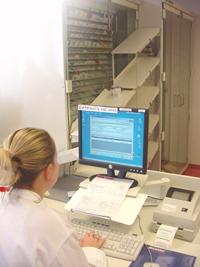Looking for some drugs?
|
|
Some websites that sell medicine can be not state-licensed pharmacies or aren't pharmacies at all; or may give a diagnosis that is not correct and sell medicine that is not right for you or your condition; or won't protect your personal information. Make sure the site requires a prescription and has a pharmacist available for questions. Buying your medicine online can be easy. Just make sure you do it safely. There are several types of risks from medicine use: a) The possibility of a harmful interaction between the medicine and a food, beverage, dietary supplement (including vitamins and herbals), or another medicine. Combinations of any of these products could increase the chance that there may be interactions. b) The chance that the medicine may not work as expected. c) The possibility that the medicine may cause additional problems. For example, every time you get into a car, there are risks---the possibility that unwanted or unexpected things could happen. You could have an accident, causing costly damage to your car, or injury to yourself or a loved one. But there are also benefits to riding in a car: you can travel farther and faster than walking, bring home more groceries from the store, and travel in cold or wet weather in greater comfort. To obtain the benefits of riding in a car, you think through the risks. You consider the condition of your car and the road, for instance, before deciding to make that trip to the store. To lower the risks and obtain the full benefits of medicines you need a)talk with your doctor, pharmacist, or other health care professionals; b)know your medicines--prescription and over-the-counter; c)read the label and follow directions; d)avoid interactions; e)monitor your medicines' effects--and the effects of other products that you use Before use a medicine make sure you understand the directions; ask your doctor if you have questions or concerns. Always double check that you have the right medicine. Read and follow the directions on the label and the directions from your doctor, pharmacist, or other health care professional. If you stop the medicine or want to use the medicine differently than directed, consult with your health care professional. Ask your doctor always if there are interactions with any other medicines or dietary supplements (including vitamins or herbal supplements), beverages, or foods. Use the same pharmacy for all of your medicine needs, whenever possible. Before starting any new medicine or dietary supplement (including vitamins or herbal supplements), ask your doctor again if there are possible interactions with what you are currently using. Ask your doctor if there is anything you can do to minimize side effects, such as eating before you take a medicine to reduce stomach upset. You always have to pay attention to how you are feeling; note any changes. Write down the changes so that you can remember to tell your doctor, pharmacist, or other health care professional. You have to know what to do if you experience side effects and when to notify your doctor, and know when you should notice an improvement and when to report back. If you take several different medicines, see more than one doctor, or have certain health conditions, you and your doctors need to be aware of all the medicines you take. Doing so will help you to avoid potential problems such as drug interactions. Drug interactions may make your drug less effective, cause unexpected side effects, or increase the action of a particular drug. Some drug interactions can even be harmful to you. Reading the label every time you use a nonprescription or prescription drug and taking the time to learn about drug interactions may be critical to your health. You can reduce the risk of potentially harmful drug interactions and side effects with a little bit of knowledge and common sense. Early in a drug's development, companies conduct research to detect or predict potential interactions between drugs. Experts evaluate the drug-interaction studies as part of assessing a drug's safety. Mixing two drugs together could make one of the drugs ineffective. The combination also could increase a drug's effect, and be harmful. The result might be mild symptoms such as nausea, stomach upset, or headache, or more serious symptoms such as a dramatic drop in blood pressure, irregular heart beat, or damage to the liver-the primary way that drugs pass through the human body. In addition to having a good grasp of drugs and their effects, doctors take medication histories, and they consult with other members of their team to guide them in making decisions about drug interactions. They also use concise drug summaries and resources on pharmacological principles. But it is good way -- consumers remind doctors of everything they take when they are prescribed a new medication. So a patient might say: "Now remember, I'm also taking birth control pills. Is there a risk of interaction with this new medicine?" Drug interactions with other drugs includes both prescription and over-the-counter medicines. Tricyclic antidepressants such as Elavil (amitriptyline) and Pamelor (nortriptyline) can interfere with blood pressure-lowering Catapres (clonidine). Taking the antibiotic Cipro (ciprofloxacin) with antacids lowers Cipro's effectiveness. Some antibiotics, such as rifampin, can lower the effectiveness of birth control pills. Sildenafil, the active ingredient in the erectile dysfunction drug Viagra, should not be taken with nitrates for heart treatment because of the potential for dangerously low blood pressure. Drug interactions with dietary supplements includes herbs and vitamins, which can interact with drug-metabolizing enzymes. St. John's wort is an herb commonly used by people with cancer to improve mood, but research has shown it interferes with the metabolism of irinotecan, a standard chemotherapy treatment. Vitamin K (in dietary supplements or food) produces blood-clotting substances that may reduce the effectiveness of blood-thinning medicines like warfarin.
European plastic surgery clinic
|

